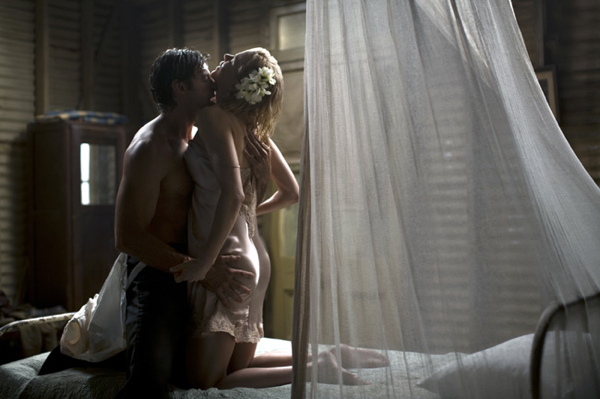Movie review by Greg Carlson
Longtime admirers comfortable with Baz Luhrmann’s “more is more” approach to filmmaking will roll with the sweeping pageantry of “Australia,” an expansive romance that wears its heart on its sleeve in every scene. “Australia” is a long-winded pastiche of classic Hollywood cinema, aping significant chunks of revered titles from “The African Queen” to “Gone with the Wind” to “Red River.” Infused with the director’s signature enthusiasm, “Australia” never quite finds a way to let its outsize comic earnestness live in harmony with a serious dearth of sophistication. Of course, Luhrmann has never been on speaking terms with subtlety, but “Australia” sorely needs it, along with a pair of editing room scissors.
Clocking in at a button-popping 165 minutes, “Australia” is essentially two features glued together as one. The movie’s first half, which focuses on the emotional transformation of a stuffy British aristocrat during a treacherous cattle drive, overshadows the second portion, which reconstructs the attack on Darwin by the Japanese in February of 1942. The overall look and feel of the air raid echoes the worst of Michael Bay’s “Pearl Harbor,” and layers of digital compositing have a tendency to make the bombing resemble a cartoon.
Luhrmann has maintained a passionate love affair with movie culture, and “Australia” relies heavily on the filmmaker’s ardor for features of decades past. “Over the Rainbow” from “The Wizard of Oz” is used like a mallet whenever a lump in the throat is needed, and the song’s inclusion as a motif feels a little mercenary. The jukebox pillaging that worked in “Moulin Rouge” does not fly this time, and Luhrmann shouldn’t need to rely on the work done by someone else’s masterpiece to manipulate the emotions of his audience.
Hugh Jackman and Nicole Kidman generate plenty of steam as the mismatched lovers of the Charlie Allnut/Rose Sayer school of opposites attracting. Jackman, as a rough and tumble horseman known by his professional moniker as “the Drover” fares slightly better than Kidman, who never quite transcends the brittle, porcelain veneer that has served her longer than necessary. It is a given that Luhrmann will stack the familiar tropes sky high, and the obviousness of beauty-and-the-beast screwball proves far easier to stomach than the moustache-twirling of David Wenham’s flat, putrid, racist, murderous villain, whose plot is wrapped up in the most ridiculous manner possible.
The best epic storytelling finds a way to balance interpersonal relationships and romances with the weight of historical events swirling all around, but “Australia” lurches in several directions as Luhrmann attempts to reconcile the Australian government’s treatment of Aboriginals of the “Stolen Generations.” The adorable Nullah (Brandon Walters), often referred to in the movie as a “creamy” or a “half caste,” gives the angles dealing with indigenous Australians a near overdose of cuteness, but other performers, especially the phenomenal David Gulpilil and David Ngoombujarra are better able to convey some of the pain the movie seeks to examine. “Australia” is by no means a disaster, but Luhrmann could use a strong collaborator who might help reign in some of the bold fantasist’s tendencies toward excess.
